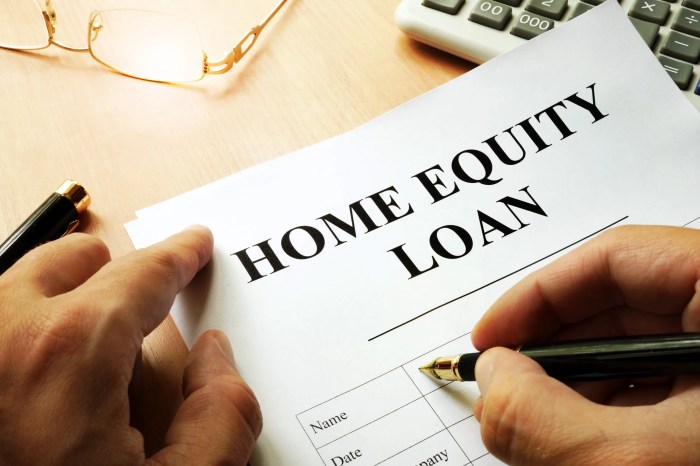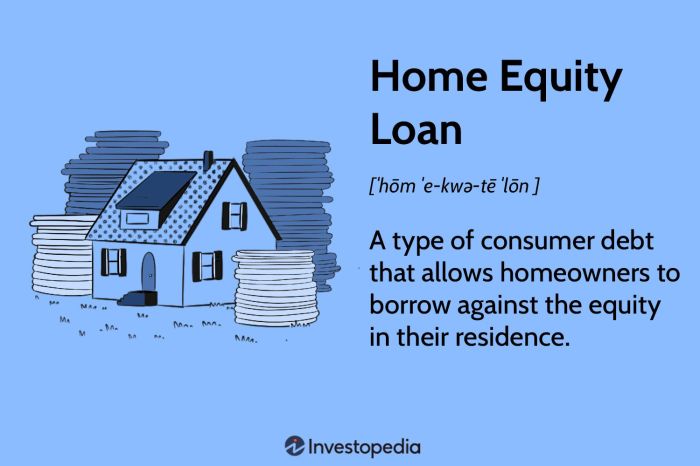
Home equity loans, also known as second mortgages, can seem like a tempting way to access cash using the equity you’ve built in your home. But before you dive into this financial option, it’s crucial to understand the potential risks involved.
Just like any loan, a home equity loan comes with its own set of considerations, and failing to fully grasp them could have serious consequences for your financial well-being.
This guide will walk you through the essential aspects of home equity loans, focusing on the potential risks, how to evaluate your financial situation, and explore alternative financing options. By understanding the risks and making informed decisions, you can determine if a home equity loan is the right choice for your specific circumstances.
Understanding Home Equity Loans
A home equity loan is a type of loan that uses the equity in your home as collateral. Equity is the difference between the current market value of your home and the amount you still owe on your mortgage. For example, if your home is worth $300,000 and you owe $150,000 on your mortgage, you have $150,000 in equity.
When you take out a home equity loan, you borrow money against that equity. The lender will give you a lump sum of money, and you will make monthly payments to repay the loan, plus interest, over a set period of time.
Advantages of Home Equity Loans
Home equity loans can be a good option for borrowers with good credit and a significant amount of equity in their homes. Here are some of the advantages of home equity loans:
- Lower interest rates: Home equity loans often have lower interest rates than other types of loans, such as personal loans or credit cards. This is because your home serves as collateral, making the loan less risky for the lender.
- Longer repayment terms: Home equity loans typically have longer repayment terms than other types of loans, which can make the monthly payments more affordable.
- Tax deductibility: Interest paid on home equity loans used for home improvements is often tax deductible.
Disadvantages of Home Equity Loans
It is important to consider the potential disadvantages before taking out a home equity loan.
- Risk of foreclosure: If you default on your home equity loan, you could lose your home.
- Higher interest rates than mortgages: While home equity loans typically have lower interest rates than other types of loans, they are generally higher than mortgage interest rates.
- Closing costs: Home equity loans typically have closing costs, which can add to the overall cost of the loan.
Real-World Examples of Situations Where a Home Equity Loan Might Be Beneficial
Home equity loans can be beneficial for various purposes. Here are a few real-world examples:
- Home improvements: You can use a home equity loan to finance major home improvements, such as a new roof, kitchen renovation, or bathroom remodel. This can increase the value of your home and make it more enjoyable to live in.
- Debt consolidation: You can use a home equity loan to consolidate high-interest debt, such as credit card debt or personal loans. This can save you money on interest payments and simplify your finances.
- Medical expenses: You can use a home equity loan to pay for unexpected medical expenses.
- Education expenses: You can use a home equity loan to pay for college tuition or other education-related expenses.
Risks Associated with Home Equity Loans
Home equity loans, while offering a potential source of funds, come with inherent risks that borrowers should carefully consider. Understanding these risks is crucial to making an informed decision and ensuring financial stability.
Loss of Home Ownership
Defaulting on a home equity loan can lead to serious consequences, including the potential loss of your home. When you take out a home equity loan, you are essentially using your home as collateral. If you fail to make your loan payments, the lender can foreclose on your home and sell it to recover their losses.
This can result in losing your home and any equity you’ve built up over time.
Evaluating Your Financial Situation

Before diving into the specifics of a home equity loan, it’s crucial to take a comprehensive look at your current financial situation. This step is vital to ensure you understand your financial capacity and make an informed decision.
Assessing Your Current Finances
Understanding your financial standing is essential before considering a home equity loan. This involves analyzing your income, expenses, debts, and assets. By evaluating these aspects, you can determine if a home equity loan aligns with your financial goals and capabilities.
- Income:This includes your regular salary, any additional income sources like part-time jobs, investments, or rental income. It’s crucial to consider your income stability and potential for future increases or decreases.
- Expenses:This encompasses your fixed expenses, such as rent, utilities, and insurance, as well as variable expenses, such as groceries, entertainment, and travel. It’s essential to create a detailed budget to accurately track your spending habits.
- Debts:This includes all outstanding loans, credit card balances, and other forms of debt. It’s crucial to evaluate your debt-to-income ratio, which is a measure of your debt obligations relative to your income.
- Assets:This includes your savings, investments, and other valuable possessions. It’s important to consider the liquidity of your assets, meaning how easily you can convert them into cash if needed.
Understanding Your Debt-to-Income Ratio
The debt-to-income ratio (DTI) is a critical metric for lenders when evaluating loan applications. It reflects the percentage of your monthly income that goes towards debt payments. A higher DTI can indicate a higher financial risk, potentially leading to higher interest rates or loan rejection.
DTI = (Monthly Debt Payments) / (Monthly Gross Income)
For example, if your monthly debt payments are $2,000 and your monthly gross income is $5,000, your DTI would be 40%. Lenders typically prefer a DTI below 43%, but this can vary depending on the lender and loan type.
Understanding Your Credit Score
Your credit score is a numerical representation of your creditworthiness, based on your credit history. Lenders use credit scores to assess your ability to repay loans. A higher credit score generally translates to lower interest rates and better loan terms.
- Credit history:This includes your payment history on credit cards, loans, and other lines of credit. It also includes the amount of credit you use, the types of credit you have, and the length of your credit history.
- Credit utilization ratio:This is the amount of credit you’re using compared to your total available credit. A lower credit utilization ratio is generally better for your credit score.
- Hard inquiries:These occur when lenders check your credit report, which can slightly lower your score.
- Public records:This includes information such as bankruptcies, foreclosures, and tax liens, which can negatively impact your credit score.
Checklist for Deciding If a Home Equity Loan is Right for You
Before applying for a home equity loan, consider the following factors:
- Purpose of the loan:Determine if the loan aligns with your financial goals and priorities. Is it for a major home improvement, debt consolidation, or other significant expenses?
- Loan terms:Compare interest rates, loan terms, and repayment options from different lenders. Consider the overall cost of the loan, including interest and fees.
- Financial flexibility:Evaluate your ability to make regular loan payments without jeopardizing your other financial obligations.
- Risk tolerance:Understand the risks associated with home equity loans, including the potential for foreclosure if you default on payments.
- Alternatives:Explore other financing options, such as personal loans, credit cards, or HELOCs, to determine the best fit for your situation.
Alternatives to Home Equity Loans
A home equity loan is not the only way to access funds using your home’s equity. Several other financing options can provide the funds you need, potentially with more favorable terms and lower risks. Let’s explore some alternatives to home equity loans.
Personal Loans
Personal loans offer a flexible way to borrow money for various purposes, including home improvements, debt consolidation, or medical expenses. They often come with fixed interest rates and a set repayment term, making it easier to budget for your monthly payments.
- Interest Rates:Personal loan interest rates typically range from 5% to 36% APR, depending on your credit score and the lender.
- Terms:Repayment terms for personal loans can vary from 1 to 7 years.
- Risks:The main risk associated with personal loans is the possibility of high interest rates, especially if you have a low credit score. You also need to ensure you can make the monthly payments without straining your budget.
Home Equity Lines of Credit (HELOCs)
HELOCs function like a credit card secured by your home’s equity. You can borrow money as needed, up to a pre-approved limit, and only pay interest on the amount you use.
- Interest Rates:HELOCs typically have variable interest rates, which can fluctuate over time.
- Terms:HELOCs usually have a draw period, during which you can borrow money, followed by a repayment period. The draw period can last 10 to 20 years, while the repayment period can be 10 to 30 years.
- Risks:The biggest risk with HELOCs is the potential for rising interest rates, which can increase your monthly payments. You also need to ensure you can repay the borrowed amount within the repayment period.
Cash-Out Refinance
This option involves refinancing your existing mortgage to a new one with a higher loan amount. The difference between the new loan amount and your current mortgage balance is paid to you in cash.
- Interest Rates:Interest rates for cash-out refinances are typically lower than those for home equity loans, but higher than those for traditional mortgages.
- Terms:The terms of a cash-out refinance can vary depending on the lender and your financial situation.
- Risks:The main risk with a cash-out refinance is that you could end up with a higher monthly mortgage payment. You also need to ensure you can afford the higher payment and the longer repayment term.
Government-Backed Loans
Government-backed loans, such as FHA loans, VA loans, and USDA loans, can offer lower interest rates and more flexible terms than conventional mortgages.
- Interest Rates:Interest rates for government-backed loans are typically lower than those for conventional mortgages.
- Terms:Government-backed loans can have longer repayment terms than conventional mortgages.
- Risks:The main risk with government-backed loans is that they may have stricter eligibility requirements. You also need to ensure you can meet the repayment terms and avoid defaulting on the loan.
Other Financing Options
Besides the above options, other financing options can be considered, depending on your specific needs and circumstances. These include:
- Credit Cards:Credit cards can offer a quick and easy way to borrow money, but they often come with high interest rates and fees.
- Family and Friends:Borrowing money from family or friends can be a good option if you need a small loan and are comfortable with the terms. However, it’s important to set clear expectations and document the loan agreement in writing.
- Savings Accounts:If you have enough savings, you can use them to finance your needs instead of taking out a loan. This way, you won’t have to pay interest or worry about repayment terms.
Seeking Professional Advice
Taking out a home equity loan is a significant financial decision that should not be taken lightly. Consulting with a financial advisor or loan officer can help you understand the risks, evaluate your financial situation, and make an informed decision.
The Role of a Financial Advisor
A financial advisor can provide unbiased guidance and help you understand the potential risks and benefits of a home equity loan. They can assess your overall financial situation, including your income, expenses, debt, and credit score, to determine if a home equity loan is a suitable option for you.
They can also help you explore alternative financing options that may be more appropriate for your needs.
Questions to Ask a Financial Advisor or Loan Officer
It is essential to ask thorough questions to ensure you fully understand the terms and conditions of a home equity loan before you commit. Here are some important questions to ask:
- What is the current interest rate for a home equity loan?
- What are the closing costs associated with a home equity loan?
- What is the loan term, and how will my monthly payments be calculated?
- What are the potential tax implications of taking out a home equity loan?
- What happens if I am unable to make my monthly payments?
- What are the consequences of defaulting on a home equity loan?
Related Financial Topics

Understanding the risks associated with home equity loans involves considering a broader financial landscape. By exploring related financial topics, you can gain a more comprehensive perspective on how a home equity loan might fit into your overall financial strategy and potential consequences.
Resources for Related Financial Topics
Here are some resources to help you learn more about related financial topics:
| Topic | Resources |
|---|---|
| Finance |
|
| Auto Loans |
|
| Bankruptcy Lawyers |
|
| Bankruptcy Medical |
|
| Bankruptcy Personal |
|
| Bankruptcy Tips Advice |
|
| Credit Counseling |
|
| Credit Tips |
|
| Currency Trading |
|
| Debt Consolidation |
|
| Debt Management |
|
| Debt Relief |
|
| Estate Plan Trusts |
|
| Home Equity Loans |
|
Outcome Summary
Taking out a home equity loan can be a complex decision, and understanding the risks is paramount. While it can provide access to funds, it’s important to carefully weigh the potential benefits against the potential consequences. By assessing your financial situation, exploring alternative options, and seeking professional advice, you can make a well-informed choice that aligns with your financial goals and minimizes the risk of jeopardizing your home ownership.
FAQs
What is the biggest risk associated with a home equity loan?
The biggest risk is the potential loss of your home. If you default on the loan, the lender can foreclose on your property, leaving you without a place to live.
How can I avoid defaulting on a home equity loan?
Make sure you can afford the monthly payments, and consider a shorter loan term to reduce the overall amount of interest you pay.
What are some alternatives to a home equity loan?
Consider personal loans, credit cards, or a cash-out refinance of your existing mortgage. These options might have lower interest rates or more flexible terms.
What should I ask a financial advisor before taking out a home equity loan?
Ask about the interest rate, loan terms, fees, and potential consequences of default. Also, discuss your overall financial situation and whether a home equity loan is the right choice for you.






